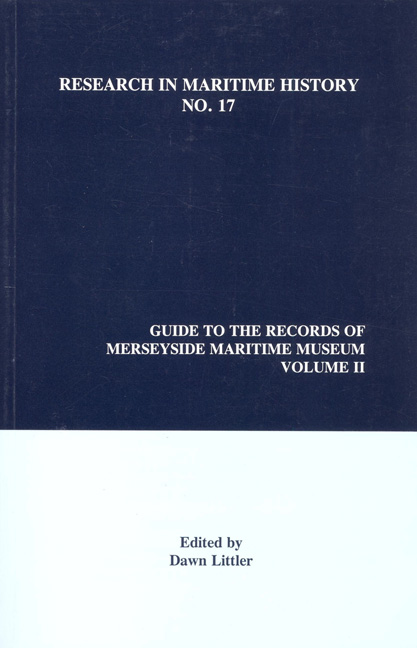Book contents
- Frontmatter
- Contents
- Introduction
- Notes on Access and Use of the Archives
- Acknowledgements
- Notes on the Editor
- List of Illustrations
- Chapter 1 Merchants, Ship Brokers and Agents, Stevedoring and Warehousing Companies
- Chapter 2 Transatlantic Slavery and Slave Trading
- Chapter 3 Emigration
- Chapter 4 Maritime Charities, Missions and Educational Establishments
- Chapter 5 Shipbuilding and Repairing, Engineering and other Maritime Trades
- Chapter 6 Maritime Families
- Chapter 7 Seafarers and Other Individuals
- Chapter 8 Special Collections: Titanic and Lusitania
- Chapter 9 Pictorial and Audio
- Chapter 10 Maritime Library
- Chapter 11 Research, Miscellaneous and Non-Maritime
- Chapter 12 Addenda to Guide, Volume I
- Index
Chapter 6 - Maritime Families
- Frontmatter
- Contents
- Introduction
- Notes on Access and Use of the Archives
- Acknowledgements
- Notes on the Editor
- List of Illustrations
- Chapter 1 Merchants, Ship Brokers and Agents, Stevedoring and Warehousing Companies
- Chapter 2 Transatlantic Slavery and Slave Trading
- Chapter 3 Emigration
- Chapter 4 Maritime Charities, Missions and Educational Establishments
- Chapter 5 Shipbuilding and Repairing, Engineering and other Maritime Trades
- Chapter 6 Maritime Families
- Chapter 7 Seafarers and Other Individuals
- Chapter 8 Special Collections: Titanic and Lusitania
- Chapter 9 Pictorial and Audio
- Chapter 10 Maritime Library
- Chapter 11 Research, Miscellaneous and Non-Maritime
- Chapter 12 Addenda to Guide, Volume I
- Index
Summary
The acquisition of large collections of archives of maritime and mercantile families has never been a primary aim of the Merseyside Maritime Museum's collecting policy. The seven maritime family collections described in this chapter are all notable for their significance in different ways, and all contain much more than just family papers, many including papers of businesses (often for which no other records survive), and records of social and economic life for the periods which they cover. Other collections of family and estate papers of shipowners and merchants can be found amongst maritime business collections, for example, much family and genealogical material can be found in the shipping company archive of T. & J. Brocklebank, and also in the E.W. Turner mercantile collection (Vol. I, chap. 4 and Vol. II, chap. 1). Family papers can also be found amongst the career papers of seamen and officers, such as in the Bell collection relating to the family of three generations of Cunard engineers (see Vol. II, chap. 7), and amongst maritime solicitors’ collections such as Alsop, Wilkinson and the Bryson accumulation (see Vol. I, chap. 11).
Two of the most notable collections of maritime family papers relate to Liverpool's involvement in the slave trade. The Cropper and Earle families represent the two opposing sides of the slavery issue, the Croppers worked for its abolition, and the Earle family were active participants in the trade during the mid-eighteenth century. Since few records of Liverpool ship-owning and mercantile partnerships survive for the eighteenth century, the Earle collection is of great importance. Both collections are notable for their bulk of correspondence and other papers relating to their family, business and social affairs, and both contain family estate deeds and papers dating from the seventeenth through to the nineteenth centuries.
Another collection which contains a large amount of genealogical and family material is the Crosbie-Oates archive, an outstanding family and maritime collection relating to early nineteenth century trade in palm oil with West Africa, life in Ireland, privateering and emigration to America. The largest collection of family papers held in the Archives Department is that relating to the Danson family which comprises over 216 boxes and volumes.
- Type
- Chapter
- Information
- Guide to the Records of Merseyside Maritime Museum , pp. 113 - 124Publisher: Liverpool University PressPrint publication year: 1999



